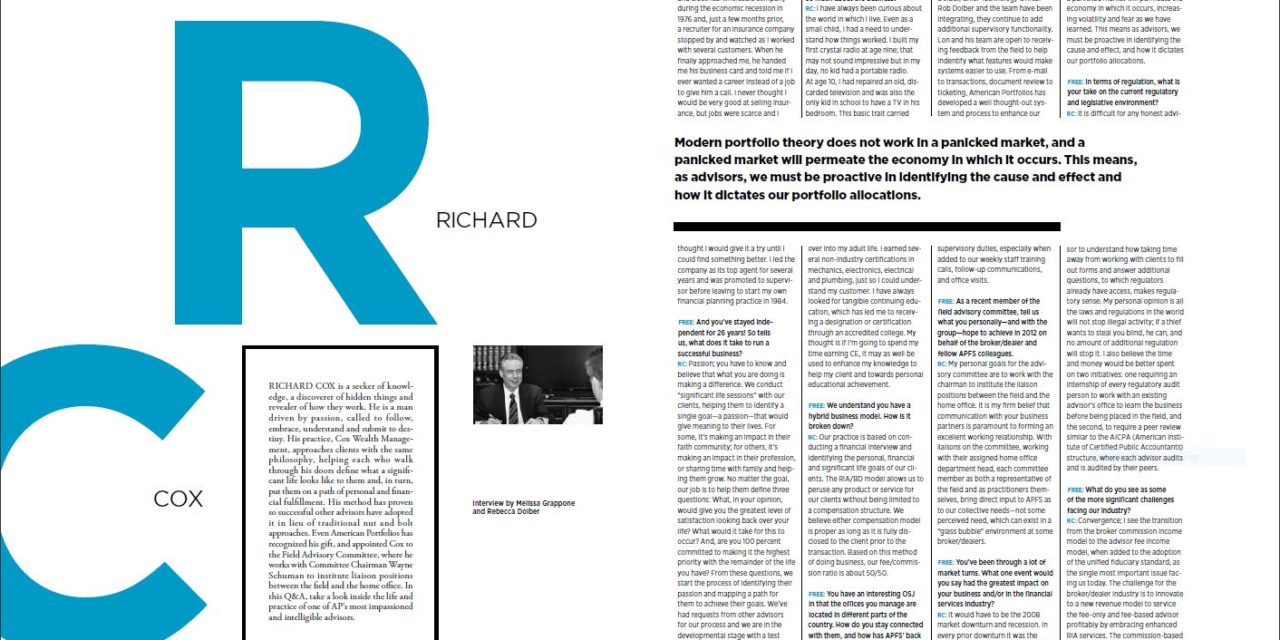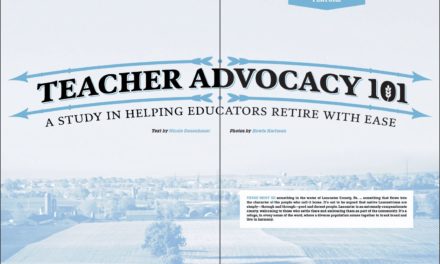
FREE 6.1 Q&A – Richard Cox
Richard Cox is a seeker of knowledge, a discoverer of hidden things and a revealer of how they work. He is a man driven by passion, called to follow, embrace, understand and submit to desting. His practice, Cox Wealth Management, approaches clients with the same philosophy, helping each who walk through his doors define what a significant life looks like to them and, in turn, put them on a path of personal and financial fulfillment.
To view the full article please register below:
FREE 6.1 Q&A – Richard Cox
Richard Cox is a seeker of knowledge, a discoverer of hidden things and a revealer of how they work. He is a man driven by passion, called to follow, embrace, understand and submit to destiny. His practice, Cox Wealth Management, approaches clients with the same philosophy, helping each who walk through his doors define what a significant life looks like to them and, in turn, put them on a path of personal and financial fulfillment. His method has proven so successful other advisors have adopted it in lieu of traditional nut and bolt approaches. Even American Portfolios has recognized his gift, and appointed Cox to the Field Advisory Committee, where he works with Committee Chairman Wayne Schuman to institute liaison positions between the field and the home office. In this Q&A, take a look inside the life and practice of one of AP’s most impassioned and intelligible advisors.
FREE: How did you begin your career in financial services?
Richard Cox: I lost my job as an assistant manager of a plumbing and electrical wholesale company during the economic recession in 1976 and, just a few months prior, a recruiter for an insurance company stopped by and watched as I worked with several customers. When he finally approached me, he handed me his business card and told me if I ever wanted a career instead of a job to give him a call. I never thought I would be very good at selling insurance, but jobs were scarce and I thought I would give it a try until I could find something better. I led the company as its top agent for several years and was promoted to supervisor before leaving to start my own financial planning practice in 1984.
FREE: And you’ve stayed independent for 26 years! So tells us, what does it take to run a successful business?
RC: Passion; you have to know and believe that what you are doing is making a difference. We conduct “significant life sessions” with our clients, helping them to identify a single goal—a passion—that would give meaning to their lives. For some, it’s making an impact in their faith community; for others, it’s making an impact in their profession, or sharing time with family and helping them grow. No matter the goal, our job is to help them define three questions: What, in your opinion, would give you the greatest level of satisfaction looking back over your life? What would it take for this to occur? And, are you 100 percent committed to making it the highest priority with the remainder of the life you have? From these questions, we start the process of identifying their passion and mapping a path for them to achieve their goals. We’ve had requests from other advisors for our process and we are in the developmental stage with a test group to modify the process so that it can be used by other advisors with their clients.
FREE: You are a distinguished advisor, your resume showing a plethora of professional designations. What has inspired you to learn so much about the business?
RC: I have always been curious about the world in which I live. Even as a small child, I had a need to understand how things worked. I built my first crystal radio at age nine; that may not sound impressive but in my day, no kid had a portable radio. At age 10, I had repaired an old, discarded television and was also the only kid in school to have a TV in his bedroom. This basic trait carried over into my adult life. I earned several non-industry certifications in mechanics, electronics, electrical and plumbing, just so I could understand my customer. I have always looked for tangible continuing education, which has led me to receiving a designation or certification through an accredited college. My thought is if I’m going to spend my time earning CE, it may as well be used to enhance my knowledge to help my client and towards personal educational achievement.
FREE: We understand you have a hybrid business model. How is it broken down?
RC: Our practice is based on conducting a financial interview and identifying the personal, financial and significant life goals of our clients. The RIA/BD model allows us to peruse any product or service for our clients without being limited to a compensation structure. We believe either compensation model is proper as long as it is fully disclosed to the client prior to the transaction. Based on this method of doing business, our fee/commission ratio is about 50/50.
FREE: You have an interesting OSJ in that the offices you manage are located in different parts of the country. How do you stay connected with them, and how has APFS’ back office systems and technology helped you achieve that?
RC: In today’s society, we are all just a phone call or mouse click away; so, the ability to supervise offices has been greatly enhanced. With the STARS system and the ongoing enhancements, which CEO Lon T. Dolber, Chief Technology Officer Rob Dolber and the team have been integrating, they continue to add additional supervisory functionality. Lon and his team are open to receiving feedback from the field to help identify what features would make systems easier to use. From e-mail to transactions, document review to ticketing, American Portfolios has developed a well thought-out system and process to enhance our supervisory duties, especially when added to our weekly staff training calls, follow-up communications, and office visits.
FREE: As a recent member of the field advisory committee, tell us what you personally—and with the group—hope to achieve in 2012 on behalf of the broker/dealer and fellow APFS colleagues.
RC: My personal goals for the advisory committee are to work with the chairman to institute the liaison positions between the field and the home office. It is my firm belief that communication with your business partners is paramount to forming an excellent working relationship. With liaisons on the committee, working with their assigned home office department head, each committee member as both a representative of the field and as practitioners themselves, bring direct input to APFS as to our collective needs—not some perceived need, which can exist in a “glass bubble” environment at some broker/dealers.
FREE: You’ve been through a lot of market turns. What one event would you say had the greatest impact on your business and/or in the financial services industry?
RC: It would have to be the 2008 market downturn and recession. In every prior downturn it was the economy which led the market into a recession; in 2008, it was the market which led the economy. While on the surface this may seem a trivial issue, there’s been a real paradigm shift in the application of modern portfolio theory (MPT). MPT does not work in a panicked market, and a panicked market will permeate the economy in which it occurs, increasing volatility and fear as we have learned. This means as advisors, we must be proactive in identifying the cause and effect, and how it dictates our portfolio allocations.
FREE: In terms of regulation, what is your take on the current regulatory and legislative environment?
RC: It is difficult for any honest advisor to understand how taking time away from working with clients to fill out forms and answer additional questions, to which regulators already have access, makes regulatory sense. My personal opinion is all the laws and regulations in the world will not stop illegal activity; if a thief wants to steal you blind, he can, and no amount of additional regulation will stop it. I also believe the time and money would be better spent on two initiatives: one requiring an internship of every regulatory audit person to work with an existing advisor’s office to learn the business before being placed in the field, and the second, to require a peer review similar to the AICPA (American Institute of Certified Public Accountants) structure, where each advisor audits and is audited by their peers.
FREE: What do you see as some of the more significant challenges facing our industry?
RC: Convergence; I see the transition from the broker commission income model to the advisor fee income model, when added to the adoption of the unified fiduciary standard, as the single most important issue facing us today. The challenge for the broker/dealer industry is to innovate to a new revenue model to service the fee-only and fee-based advisor profitably by embracing enhanced RIA services. The commission-based compensation structure will eventually be replaced by the fee-based structure and product manufacturers will modify their products accordingly. With the increased compliance and regulation of RIAs, APFS is uniquely positioned to service their needs and, I believe, to transition them to a unified advisory structure.
FREE: We know Tennessee saw some unusually serious weather in 2011; tell us if and how that had an impact on your practice and what disaster recovery measures you had to fall back on.
RC: We had to use our disaster recovery plan for the first time twice this past year; once from an ice storm disrupting power for a few days and then from a tornado in the spring, which disrupted power for over a week. We transferred the office phone system to our cell phones so we could continue to care for our clients. Even though we had no power at the office, we still felt it necessary to maintain a presence for those clients who needed help. We came in each day and worked using our battery powered laptops until sunset and stayed at a local hotel at night using their business center for evening work. It was a real learning experience. As a result of this, we transferred our e-mail server to a cloud based service by Microsoft, used a cloud based backup service that can be restored on the fly and we have scheduled the expenditure for a gas-powered generator at the office this coming year.
FREE: Somehow, you found the time to host a local, talk radio program. Tell us how that started and what it was like to be a radio personality.
RC: I started on the local talk radio station in 1999 by being invited to appear with a radio personality who wanted to highlight my practice. It was a call-in show and, not knowing any better, I just assumed they had a lot of calls; I must have answered 8-10 calls over the 30 minute period. Afterward, I learned that was the most calls they ever received during a show and the station manager approached me about doing my own show. I really enjoyed it, but the regulations became so onerous at my previous B/D that I finally had to quit after almost eight years on the air. However, I still appear as an invited guest on area radio and television stations.
FREE: There’s an unmistakable passion you have for this business; what else in your life do you bring a passion to?
RC: My faith; I believe in sharing my faith and attend regularly at my church. I believe in a divine presence in my life that guides my steps and corrects my mistakes, and pray that each person I meet has a similar relationship. My family is a close second. I love my children and grandchildren and I cannot think of any greater pleasure than spending time with them, mentoring them and enjoying them. I have a father’s heart and am honored that my family can come to me with any problem. I am also passionate about my community and have served on various community outreach programs like 40 Days of Purpose, Men’s Fraternity, Adopt a School, Boy Scouts, 4-H, Girl Scouts, Crown Financial Ministries and other like ministries. I believe to whom much is given, much is required, so I have served on the boards of several professional associations over my career to give back to this profession, which has been good to me and my family.
FREE: Where do you see yourself professionally and personally in the next five to 10 years?
RC: I see myself working with a world class organization building the next generation of financial services companies. This will look vastly different from the companies that exist today. The secret is finding those who have a passion to make it happen. As the old saying goes “Many are called, but few are chosen.” The advisors who can innovate, adapt, and grow their practices will have a very bright future indeed. I want to live long enough to see my efforts prove fruitful in the lives of those I touch, for in so doing, a little of me will live on long after I’m gone.
FREE: It was a pleasure talking withyou Richard.
RC: My pleasure as well.












